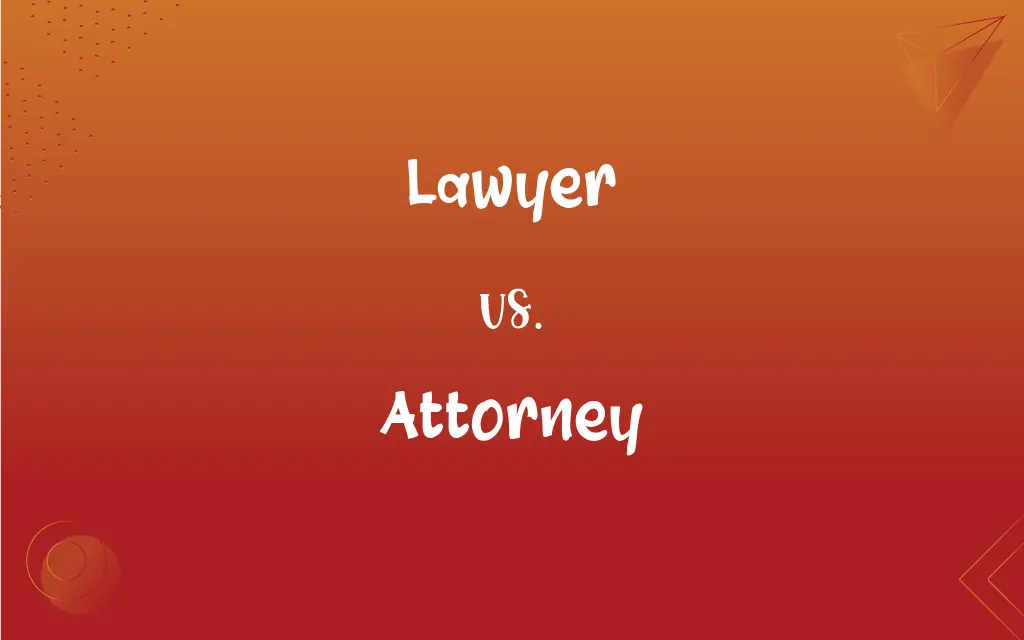Lawyer vs. Attorney: What's the Difference?
Edited by Aimie Carlson || By Harlon Moss || Updated on October 25, 2023
A "lawyer" is someone trained in law, while an "attorney" specifically represents clients in court and legal matters. Both terms are often used interchangeably in the U.S.

Key Differences
A "lawyer" is a general term that refers to any individual who has undergone legal education and is qualified to provide legal advice. This term is broad and encompasses anyone who has attained a law degree. On the other hand, an "attorney" is a type of lawyer who not only has a law degree but is also licensed to practice law in a specific jurisdiction. Essentially, all attorneys are lawyers, but not all lawyers are attorneys.
The distinction between a lawyer and an attorney becomes clearer when we consider representation in court. While a lawyer might be equipped with legal knowledge, it's the attorney who has the authority to represent clients in court. The word "attorney" is derived from the verb "attorn," meaning to transfer one's rights to another. This implies the act of representing someone else's interests, especially in legal matters.
Another important distinction lies in the terminology. In many parts of the world, the term "lawyer" is universally understood to mean someone knowledgeable in law. However, "attorney" is a term predominantly used in the United States. In the U.S., both words, lawyer and attorney, are commonly used interchangeably.
Additionally, there are specific titles and roles within the legal profession that further differentiate between types of lawyers. For instance, an attorney who represents the government in criminal prosecutions might be called a "prosecutor" or "district attorney." But regardless of these distinctions, the foundational difference remains: an attorney is a lawyer authorized to practice law and represent clients, while a lawyer is a broader term referring to anyone trained in law.
Comparison Chart
Definition
An individual trained in law
A lawyer licensed to practice law & represent clients
ADVERTISEMENT
Court Representation
May not have the authority to represent in court
Has the authority to represent clients in court
Licensing
Has a law degree
Has passed the bar & is licensed in a jurisdiction
Usage Globally
Universally understood term
Predominantly used in the U.S.
Broadness of Term
General term for anyone trained in law
Specific type of lawyer with representation rights
Lawyer and Attorney Definitions
Lawyer
Lawyer is someone knowledgeable in legal matters.
The lawyer reviewed the contract thoroughly.
ADVERTISEMENT
Attorney
Attorney can act on behalf of another in legal matters.
His attorney filed the necessary paperwork.
Lawyer
Lawyer is a general term for those who have a law degree.
After graduation, he became a lawyer.
Attorney
Attorney represents clients in legal proceedings.
She appointed an attorney to handle her divorce.
Lawyer
Lawyer can provide legal advice and counsel.
The startup hired a lawyer for legal guidance.
Attorney
Attorney is a lawyer authorized to practice law.
The attorney presented the case brilliantly in court.
Lawyer
Lawyer is a term used globally to indicate legal professionals.
While traveling, he met a lawyer from Australia.
Attorney
Attorney is especially known for court representations.
The defense attorney provided strong arguments.
Lawyer
Lawyer refers to a professional trained in law.
She consulted a lawyer about her inheritance.
Attorney
Attorney is a term primarily used in the U.S. for licensed lawyers.
The U.S. attorney worked on international cases.
Lawyer
One whose profession is to give legal advice and assistance to clients and represent them in court or in other legal matters.
Attorney
A person who is legally qualified and licensed to represent a person in a legal matter, such as a transaction or lawsuit.
FAQs
What is an attorney?
In the U.S., an attorney, often referred to as an "attorney-at-law," is someone who is licensed to practice law and can represent clients in court. Outside the U.S., the term can have other meanings.
What is a lawyer?
A lawyer is a professional who has been trained in law and is qualified to give legal advice or represent clients in court.
What's a "power of attorney"?
It's a legal document that grants one person (the agent) the authority to act on behalf of another person (the principal) in specific matters.
Are all attorneys considered officers of the court?
Yes, in the U.S., attorneys, once admitted to the bar, are considered officers of the court, emphasizing their duty to both their clients and the justice system.
What's the difference between a "defense attorney" and a "prosecutor"?
A defense attorney represents the accused in criminal proceedings, while a prosecutor represents the government and seeks to prove the accused's guilt.
Are the terms lawyer and attorney interchangeable?
In the U.S., the terms are largely interchangeable. However, in other countries, distinctions between the terms may exist.
How does one become a lawyer?
Typically, one becomes a lawyer by completing law school and earning a Juris Doctor (JD) degree.
Can lawyers give legal advice without being attorneys?
This varies by jurisdiction. In the U.S., only licensed attorneys should give legal advice. However, a law school graduate may possess legal knowledge without being licensed.
Is an attorney always a litigator?
No. Litigators are attorneys who specialize in bringing and defending lawsuits. Not all attorneys engage in litigation.
Can an attorney represent clients in any state?
Generally, attorneys are licensed to practice in a specific state. To represent clients in another state, they typically need to be admitted to that state's bar.
Is it a good idea to have an attorney for non-litigation matters?
Yes, attorneys can advise on contracts, estate planning, business formation, and other non-litigation matters, helping clients navigate legal complexities and avoid potential pitfalls.
Do all lawyers go to court?
No, not all lawyers go to court. Some might specialize in areas like contracts, wills, or corporate law and may seldom or never appear in court.
What's the main difference between a lawyer and an attorney?
In the U.S., there’s minimal difference: all attorneys are lawyers, but not all lawyers are necessarily attorneys (i.e., not all have passed the bar or are licensed to represent clients in court).
How does one become an attorney?
In the U.S., after completing law school, one must pass the state bar examination to become an attorney licensed to practice in that state.
Do you need an attorney to file a lawsuit?
No, individuals can represent themselves ("pro se"). However, having an attorney can be beneficial given the complexities of the law.
How do attorneys typically charge?
Attorneys might charge hourly rates, flat fees, contingency fees (a percentage of the client's winnings), or retainer fees, depending on the case and agreement.
Can a lawyer work in areas of law without specializing in them?
While a lawyer can work in multiple areas, it's crucial they're competent in each area. Specialization often indicates deep expertise in a particular field.
Why do some lawyers use "Esq." after their names?
"Esq." stands for "Esquire." In the U.S., it's an honorary title used by some attorneys to signify their profession.
Do all countries use the terms lawyer and attorney?
No. Other countries might use terms like solicitor, barrister, advocate, or counsel to refer to legal professionals.
What's a "trial attorney"?
A trial attorney specializes in representing clients during courtroom trials.
About Author
Written by
Harlon MossHarlon is a seasoned quality moderator and accomplished content writer for Difference Wiki. An alumnus of the prestigious University of California, he earned his degree in Computer Science. Leveraging his academic background, Harlon brings a meticulous and informed perspective to his work, ensuring content accuracy and excellence.
Edited by
Aimie CarlsonAimie Carlson, holding a master's degree in English literature, is a fervent English language enthusiast. She lends her writing talents to Difference Wiki, a prominent website that specializes in comparisons, offering readers insightful analyses that both captivate and inform.































































